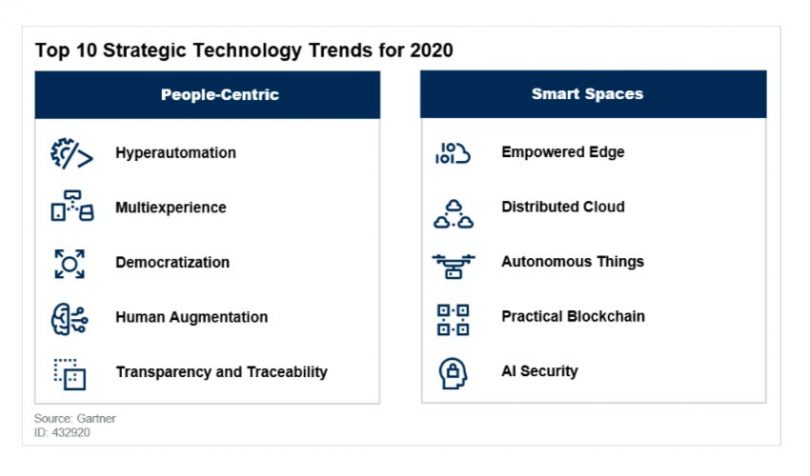Research and advisory firm Gartner listed blockchain as one of the top ten strategic technologies for 2020. It said public blockchains are presently too immature for enterprise deployment due to poor scalability and interoperability but expects the technology to overcome these issues by 2023.
However, it sees a current role for enterprise blockchain in digital transformation with “evolutionary and incremental improvements” in trust and transparency.
The report, ‘Top 10 Strategic Technology Trends for 2020’, suggests enterprises at the very least start evaluating distributed ledger technologies (DLT), if not adopting it, citing the technology’s potential for disruption and revenue generation.
The research firm says blockchain has the potential to reshape industries by enabling trust, providing transparency and enabling value exchange across businesses. Other benefits include a reduction in transaction costs and settlement times and improvements in cash flow.
One of the issues with enterprise blockchain currently is that most networks are permissioned and run by a central authority.
However, Gartner sees this as an evolutionary phase and expects permissioned blockchains to integrate with public blockchains in the future. A critical enterprise requirement is private transactions which are increasingly being enabled on public blockchains. The integration of private with public blockchains will be possible with technology improvements while still supporting the membership, governance and operating model requirements of permissioned blockchains.
Gartner listed eleven use cases for blockchain. Many relate to data such as asset tracking, provenance, and both internal and shared record-keeping. Several applications orient around finance and banking including payments/settlement, trade finance, trading and insurance claims. Other use cases have broader applications such as identity and know your client, IoT and smart cities, and loyalty and rewards.
At present, blockchain networks are primarily dependent on forming a consortium to exchange information. Gartner categorizes blockchain consortia into four types — technology-centric, geographically centric, industry-centric and process-centric. The report advises organizations to carefully consider their participation in a consortium by evaluating its impact on their business.
Gartner has published several reports discussing blockchain adoption and future prospects. A few months ago, in its blockchain hype cycle report, Gartner said about 60% of CIOs across sectors expect some adoption of blockchain in the next three years.
It previously discussed the problem of blockchain interoperability and a lack of standards. Citing this, Gartner sees blockchain deployment in financial services at least three years away. But banking is still the most mature sector in terms of adoption.
The research firm in its hype cycle for digital marketing and advertising report saw blockchain as an emerging trend. Gartner described blockchain as having “tremendous promise” for marketers.
The year 2023 is pegged as an important year for blockchain. Moving through different phases of development, Gartner envisages the technology will unlock value in 2023. Until then, the industry will see several changes with advancements in technology and a lot of trial and error. Six months ago it estimated that 90% of enterprise blockchain platforms will become obsolete within two years.






